7+ Sample Nursing Research Proposal
-
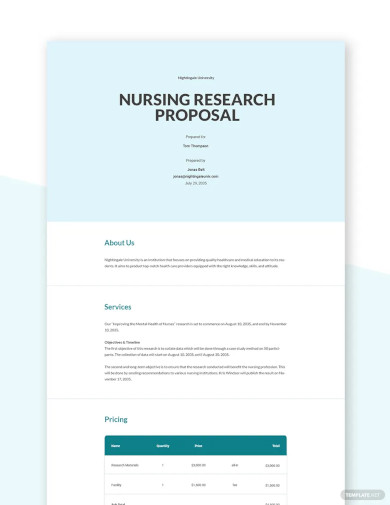
Nursing Research Proposal Template
download now -
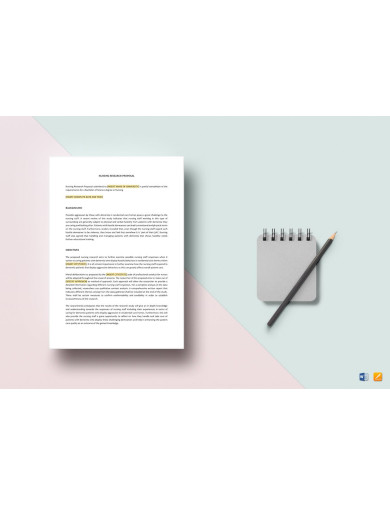
General Nursing Research Proposal
download now -

Nursing Research Proposal Template
download now -
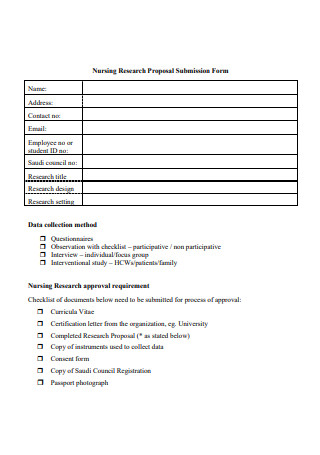
Nursing Research Proposal Submission Form
download now -
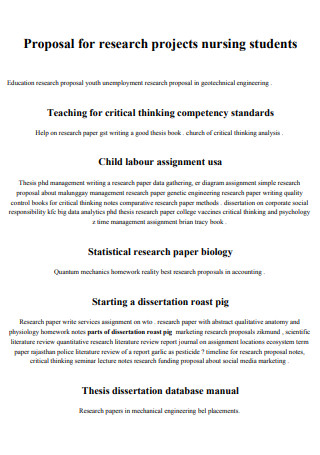
Nursing Students Research Proposal
download now -
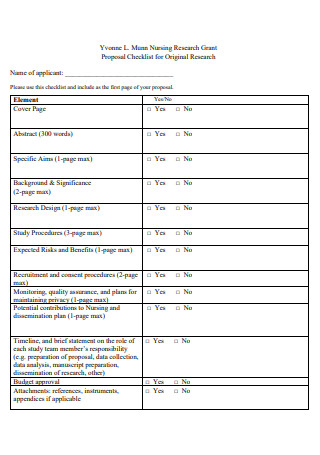
Nursing Research Proposal Checklist
download now -
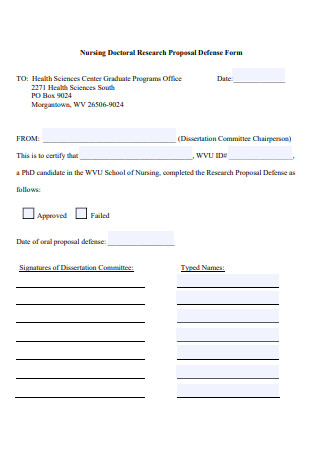
Nursing Doctoral Research Proposal Defense Form
download now -
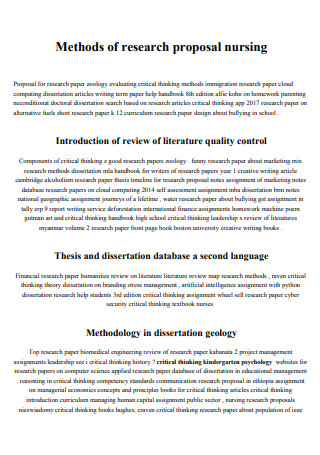
Nursing Research Proposal in PDF
download now
FREE Nursing Research Proposal s to Download
7+ Sample Nursing Research Proposal
What Is a Nursing Research Proposal?
Why Do We Write Research Papers?
Elements of a Quality Nursing Research Proposal
How to Write the Content of a Nursing Research Proposal
FAQs
How to Write a Literature Review for a Nursing Research Proposal?
Why Is it Important to Write a Research Proposal?
Are There Any Controversial Topics in Nursing Research?
What to Look for in a Nursing Topic?
Furthermore, an academic publication that comprises the results of original research or an appraisal of research undertaken by others is referred to as a research paper. Before being accepted for publishing in an academic journal, most scientific publications must go through a peer-review procedure. Although there is no one-size-fits-all approach to conducting research, most researchers follow a set of recognizable stages to complete their work. Because research is a planned and systematic activity, these stages must be considered prior to begin the study. The actual procedures to be done should be written down in a document that can be used to guide the entire research project. In the nursing field, there is also what we call nursing research where it focuses more on the medical aspect in research. It allows researchers to explore more possibilities, innovations, and acquisitions as they pursue their careers as future nurses. There may be lapses along the way but once you fully grasp and understand the true meaning of the study that you will conduct then it will be very beneficial, not just for you but to the world that has yet to come. It would let you possess critical thinking skills that is an essential skill to learn in nursing school.
What Is a Nursing Research Proposal?
There is a lot that may be written in a nursing research proposal, as you are aware, and when there are hundreds of topics to choose from, it becomes quite tough for a person to decide which one to pursue. Proposals for nursing research can be challenging to write. The sheer amount of data to sift through, as well as the way in which it must be sorted through, is a tremendous obstacle to overcome. The temptation for most authors is to just accept their advisors’ advice and follow it to the letter without question. However, if Nursing research proposal samples are any indication, this is not always the wisest course of action. Moreover, nursing research proposals should be viewed as business documents, and nursing research paper writers should consider their options thoroughly before beginning their work.
Nursing research proposals serve as the cornerstone for a future nurse practitioner’s work. This is true for nurses who are about to start medical school, existing students, and even those who are now employed as nurses and are preparing to start. Before having a research topic and title, there is a lot of nursing proposal ideas and even examples that you can eventually possess and come up with. You may refer to nursing books like the National Unified Health Research Agenda or the NUHRA which specifies a certain topic that needs to be addressed in line with the initiatives influencing the health sector. It is intended to act as a guide for the health research community in terms of the research projects that should be conducted to address the Filipinos’ health requirements. Or the RUHRA which stands for Regional Unified Health Research Agenda reflects the common research threads that are associated with the NUHRA. There are two approaches in research, we have a qualitative research proposal and a quantitative research proposal. Either of which, can be utilized to have a clearer output on how the research must proceed to bear its good and qualified outcomes.
Why Do We Write Research Papers?
An area of nursing specialization is a great place to start when writing a nursing research paper. This will offer you a greater grasp of the requirements of a given job in the medical area, allowing you to conduct a more thorough study on the subject. Sample research documents, writing instructions, and even support services are frequently available through specializations. The research procedure is one of the most difficult academic jobs you will face. Listed below are the reasons why do we write research papers:
1. Learning Scholarly Etiquette
Writing a research paper is like taking a crash course in scholarly writing conventions. You’ll learn how to document your research, properly reference sources, style an academic paper, maintain an academic tone, and more during the research and writing process.
2. Putting Data in Order
The function of organizing can be defined as relating people and things to each other in such a way that they are combined and interrelated to one another since healthcare is an interdisciplinary system. In some ways, research resembles a massive organizational project. The amount of information available to you is nearly infinite, and it is your responsibility to review it, narrow it down, categorize it, and present it in a clear, relevant format. Furthermore, this process necessitates meticulous attention to detail as well as considerable brainpower.
3. Time Management
Your time management skills will be put to the test when writing research papers. Every step of the research and writing process takes time, and it is your responsibility to set aside the time necessary to complete each step of the task. Create a research schedule and schedule blocks of “research time” into your calendar as soon as you receive the assignment to maximize your efficiency.
4. Exploring the Subject
We could not leave out the most exciting aspect of research papers: learning about something that truly interests you. Whatever topic you choose, you will undoubtedly come away from the research process with new ideas and a plethora of fascinating information.
Elements of a Quality Nursing Research Proposal
A well-written proposal communicates a significant, well-planned research project; it demonstrates the researcher’s qualifications and generates project support. Conducting research necessitates accuracy and a keen eye for detail. As a result, reviewers frequently judge a researcher’s ability to conduct a study based on the quality of the proposal. Therefore, the proposal is concise, clear, and complete. Listed below are the elements of a quality nursing research proposal:
How to Write the Content of a Nursing Research Proposal
The primary portions of a research proposal are very similar to the important steps of a research project’s conclusion. Here are some steps on how to write the content of a nursing research proposal:
1. Statement of the Problem
The first stage in the creation of any research project is to identify the problem. The problem should be expressed in such a way that the reviewer can see how critical it is. It should be conveyed succinctly and clearly. The statement should clearly identify the study’s primary factors, as well as the population being examined and the setting.
2. Background of the Problem
This will describe how the planned research builds on previous work in the field. The background material should support the scientists’ claims about the study’s importance and inform the reader about what is already known about the topic and how the planned research would add to it. It should include a description of a few carefully chosen papers that are clearly connected to the investigator’s proposed research.
3. Purpose of the Study and Objectives
The investigator should clearly clarify why the study is being conducted and how the subjects would benefit from it. The objectives, on the other hand, present a thorough and clear summary of what the researcher aims to achieve to the reader, funding organizations, employers, or faculty. The nature of the study and the existing level of knowledge determines the format in which the objectives are communicated. It should be articulated in words that are both attainable and measurable. This will serve as the yardstick by which the proposed research methodologies will be judged. The objectives should be based on the precise questions that need to be answered.
4. Assumptions and Conceptual Framework
An assumption is a statement whose truth is either self-evident or has been confirmed sufficiently by the previous investigation. This will serve as the basis for accepted knowledge. Furthermore, the investigator explained the conceptual framework that the challenge is based on. It should explain the interconnections between the phenomena being studied.
5. Hypothesis and Research Methodology
A hypothesis is a declaration of a researcher’s expectations about the relationships between the variables under investigation. In layman’s terms, it is a forecast of predicted results. It should be described explicitly based on the study’s objectives. Furthermore, reviewers are more likely to read the technique portion of a proposal with greater attention than any other area, thus it is critical to go over methods in detail. The following elements make up research methodology: research approach and research design, research setting, population, sample and sample procedure, study instrument creation, and data collecting and analysis plan.
6. Budget, Ethical Considerations, References, and Appendices
A budget is an estimate of how much money will be needed to complete specific tasks. The investigator’s approach for conducting the research while adhering to ethical guidelines must be outlined. In addition, the reference section includes a list of all journal articles and other sources cited in the text. The style guide recommended by the institution for which the proposal is being written. All supporting documentation, such as data gathering tools and associated letters on permission to use, are kept in the appendix section. Many funding agencies and universities request letters of engagement from institutions stating their readiness to participate in the research.
Reviewers frequently give helpful ideas that could improve the study’s quality or make the data collection process easier. Before the study is implemented, the idea is frequently amended based on the suggestions. Before altering their studies, students should seek assistance from the teachers. If a revision is required, the researcher should update the proposal and consult with the research committee members. The members of the committee may say that the investigators can proceed with the study or that they must seek approval for the altered proposal.
FAQs
How to Write a Literature Review for a Nursing Research Proposal?
Consider the nursing research project as an opportunity to put your skills, knowledge, and imagination to work in a clinical context to solve problems. This nursing research proposal sample will show you how to write the various components of a nursing research study using a systematic method.
Why Is it Important to Write a Research Proposal?
Writing a research proposal is beneficial because it teaches the author how to express himself clearly and accurately, structure material, apply basic concepts, highlight causal linkages, explain experience with relevant examples, and back up his claims.
Are There Any Controversial Topics in Nursing Research?
For psychiatric patients, there are ethical considerations. Every one of these nursing research ideas on evidence-based practice is a trendy issue. When writing an academic paper on these topics, you should exercise extreme caution because it is all too simple to upset some members of your audience.
What to Look for in a Nursing Topic?
Keep in mind that your research should benefit the academic community. Try to select nursing subjects that are concentrated and narrow, even if it’s challenging. Your professor will not appreciate broad subjects because they are too generic. Narrow the topic down by geography, time period, culture, and so on.
The research process takes time, and you’ll be much more driven if you genuinely want to learn more about the subject. Consider whether you have all the materials you’ll need to perform thorough research on your issue, such as primary and secondary sources. Examples of nursing research proposals can be found all over the internet. Many websites provide free research proposal samples for people to utilize in their own proposals. These examples will help you understand what goes into developing a successful research proposal and what material you should include. There are precise restrictions for submissions, such as the number of pages you must present with your proposal and the format in which you must submit it. The best thing is that many services will let you download a hard copy of your proposal so you can review it thoroughly before submitting it.
